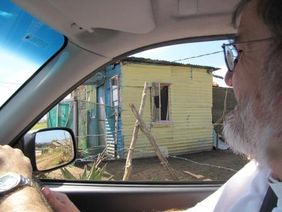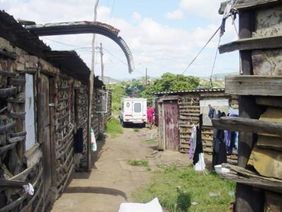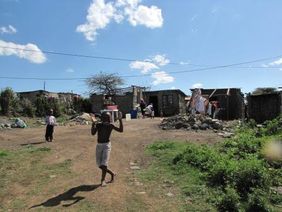Today my brother, Father Gerhard Lagleder, and I are starting a somewhat different photo safari than is usually the case in South Africa. We are not photographing lions, elephants and giraffes. We are travelling through a breathtaking landscape. The hills slope softly down to the Tugela River. Palm trees complete the picturesque image of a paradise where a relentless war rages. We stand on a hill and look down into the valley. Gerhard says: "Look, this is the valley of death, the Aids hell. Almost 90% of the population is HIV infected, many have AIDS."
Father Gerhard's concern is to show the catastrophic living conditions and the plight of the people. Driving through the slum that has grown up around the paper factory and the large industrial area in Isithebe (about 50,000 people) and the township of Sundumbili (about 100,000 people), I am confronted with pure poverty. On the unpaved roads, one can only get ahead with an off-road vehicle. Thanks to the donation of Peter Wiedemann from Neuburg, who asked for donations for the "Brotherhood of Blessed Gerard" instead of presents on the occasion of his 50th birthday, it was possible to buy an urgently needed vehicle by doubling the amount donated by Rotary International. As the Brotherhood's projects depend almost entirely on donations, we are infinitely grateful for any gift that helps to support people in their time of need.
18 years ago, we had taken a very short drive through the criminally dangerous area. The car was locked from the inside, the windows closed. Today, the doors are closed, but the windows are wide open. "Please take pictures, take as many pictures as you can, stay on the shutter. The people of the world need to know how staggeringly bad things are for the poor here."
I photograph shacks that serve as dwellings and simple huts for industrial workers, built for them by brutal profiteers. The workers have six square metres each and have to pay high rents for them. They are built like terraced houses. There are no sanitary facilities, water has to be fetched with canisters from far away. These people live in the midst of their mountains of rubbish. Goats, chickens and children run through the rubbish.
Unimaginable and indescribable is the place where animals are slaughtered. The hygienic conditions are devastating. A place where diseases are born. Corrugated iron, barbed wire, car tyres, plastic sheets and pieces of wood are among the building materials. About 30% of the children do not go to school. Most families cannot afford the school fees.
As we drive by, people keep running out of their huts, waving and shouting, "Baba, Baba Gerard!" The children jump for joy and the adults laugh at him. Many also know him from the hospice where they themselves or family members have been. Yes, a lot has changed since the last 18 years. The Brotherhood vehicles are well known. Through direct aid, such as food parcels, many people have been helped, for example, when they were ill and therefore unable to work. The sewing school has also helped many women, because they have been trained and now have their own sewing schools or work as tailors. The sick receive medical care, and the scholarship fund pays the school fees for some children. These people have understood that education pulls them out of the vicious circle of poverty. Those who attend school and continue their education find good jobs, those who have good jobs earn enough money and can move away from the slum. We in Germany don't have to pay school fees and can be grateful for the rich education on offer.
My brother points to a few huts and tells how they had taken one of the children who now lives in Blessed Gerard's children's home out of there. Completely emaciated, badly abused and sick. People who felt sorry for the child reported it to the social welfare office, which then contacted the Care Centre directly. Another child, freshly born at the time, was still lying next to the placenta, covered in ants next to a large pile of rubbish. Brotherhood helpers took the "bundle" away. This child also lives in the children's home today and he hugged me and laughed happily into my eyes. Of course, he himself knows nothing of his own story.
The images I have seen often flash through my mind, situations I have experienced at first hand.


